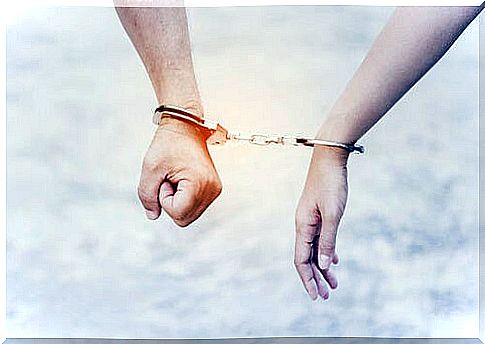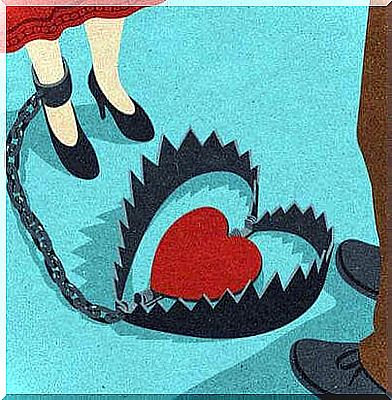Do You Know What Characterizes Emotional Codependency?

Codependency is an addiction to dependence on another person, which can occur both in relationships as well as within the family: for example, between a mother and a daughter. Thus, regardless of the context, in highly dependent relationships, the dependent person feels that he needs the other, just as he needs his heart, to continue living. We would speak of a psychological dependence in which the emotional part is highly involved.
In this sense, dependency goes beyond the mere desire to be next to someone. It has to do with thinking that the other is essential or irreplaceable to feel good: their presence is a necessary condition for this to happen. It is a need that must be satisfied in any way, no matter how particular and specific, that leads to happiness.
On other occasions, what happens is that it is not only one member of the couple who is attached to the other, but it is both who depend, just in different ways. We are entering, in this sense, what is known as emotional codependency.
What happens in a codependent relationship is that there is a dependent member whose happiness ultimately depends on his partner being by his side and not abandoning him. On the other hand, the other member of the couple is also dependent, but dependent on their partner.
Codependency or altruism?
To understand each other better, the dependent person needs his partner and the codependent needs to protect, care for, help and care for the well-being of his partner. It is true that taking care actions towards the couple is extremely necessary to keep the relationship afloat, but as long as they are done altruistically, out of love for that person and not to feed an underlying dependency.

It is as if ensuring the safety of the other, protecting them excessively or taking care of them as if they did not have the resources to do so somehow empowers the codependent partner and strengthens their self-esteem. In addition, this way of acting is the water that quenches the thirst of the dependent, so the pieces of the puzzle end up fitting together perfectly and causing the dependence to be reinforced frequently.
What is the ultimate result of this dynamic? The codependent couple never experiences a healthy and satisfactory relationship, but the suffering and the feeling of emptiness within the relationship take center stage. In the rare case that the relationship is maintained over time, both have to endure tremendously intense discomfort, since they end up losing their own identity.
Symptoms and characteristics of emotional codependency
Although the protective person may seem strong, the truth is that it is not. In reality, in the behaviors of caring for the partner, he finds the only way to take care of his self-esteem. So, if you want to know more about the symptoms of emotional codependency, keep reading:
Self-esteem is conspicuous by its absence
As we said before, codependent people tend to have low self-esteem that they try to make up for with the feeling of usefulness that can have repercussions knowing that they are valuable to others, in this case to their partner.
In many cases, this lack originates from an anxious attachment pattern that began to form in childhood, in the relationship that it established with its main reference figures. In this sense, it is easy that they only rewarded her when she made a lake for them; From there, it is how he learned that his value only depended on what he was able to contribute to others.
They seek to control the other person
Because their self-esteem depends on the other’s need for them, they tend to use manipulation and control as a way for “their victim” not to get away. That is, to feel valuable and useful they need the other person to continue to maintain their dependent behaviors and this can only be ensured by controlling the partner.
Another common strategy to maintain dependence on the other is to undermine their self-esteem. Yes, making the other person feel invalid or worthless, so that they need someone to come to the rescue. It is then that she appears, seemingly selfless and sacrificing herself.
They fear the independence of the other
The moment they realize that the other person has taken some more independent action, such as making a decision alone, they panic and try to restore this situation. For this reason, it is not uncommon for them to abandon what they are doing in order to help the other person and continue to maintain their superior position of protector of the other.
They obsess over the partner
In their heads, the couple is a focus of constant supervision. In this way, they become obsessive, end up losing themselves and believe that facilitating the life of their partner is the only mission from which they can obtain well-being. In addition, if they make a mistake in this regard, it is difficult for them to forgive them and frustration floods them.

They need too much approval
The approval of others is a universal reinforcement and in many cases a valid source of information to evaluate our performance, but when we put all our self-esteem in the judgment that others can make, we have a problem. In this sense, codependent people have a great need for approval that they try to meet regardless of the form. And who better to give immediate probation than the dependent person?
They feel responsible for the emotions of the other
Although we know that the emotions of others do not belong to us, many times we can feel responsible for how others feel. It is not strange, we have been educated in this regard. “Don’t make Dad angry”, “If you do, Mom will be sad.”
However, this thought is much more marked in codependent people: they believe that the other is right or wrong depending on how they have acted. Thus, on many occasions they end up carrying responsibilities that do not correspond to them or with the blame for something that has never been in their hands.
They usually reproach the partner
On the one hand, they need to feel useful helping their partner or another person in their environment who is dependent on them. However, the moment they do something that contradicts this pattern, they tend to blame or reproach them as a strategy to make the other person feel bad and change their behavior. In this sense, expressions such as: “With everything I do for you and so you pay me,” are common in this sense, “You don’t know what I sacrifice for you”, “I have left everything to make you happy”, and so on.
The concept of emotional codependency was created expressly to classify all those people who manifested emotional disturbances as a result of their partners suffering from a substance-related disorder. Like, for example, drug addiction or alcoholism. Given this variability, currently, a personality pattern of this type of people cannot be clearly defined.
However, the characteristics that have been described in this article do allow us to identify some salient features of this emotional codependency. Besides all of them, others less conspicuous, but particular to this maladjustment are personal neglect and self-cancellation; coupled with a very low confidence and self-esteem. And the fact these people usually have a history of love relationships, personal and / or sentimental characterized by their toxicity.
Identified with any of the parties? Although this way of acting in the couple may surprise us, it is more common than we can imagine. Therefore, if you have felt identified, analyze what is failing, give your self-esteem a chance and dare to experience a healthy relationship.









